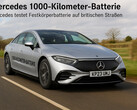One of the world's top 10 battery makers has joined the growing number of peers that have now moved their solid-state battery plans from the easier R&D and prototype phases to the tough mass production stage.
Solid-state cells are still prohibitively expensive to make in large numbers, which explains why Tesla suppliers like CATL or Panasonic don't consider them a viable alternative to EV batteries before 2030 or so, but say that they'd be suitable for applications like drones.
Fittingly enough, Eve Energy has announced a mass solid-state battery production factory that will assemble its 10 Ah cells with sulfide-based solid electrolyte into 60 Ah meant to power Unmanned Aerial Vehicles (UAVs) and Tesla Optimus-style humanoid robots, as well as AI-powered IoT gear.
Solid-state batteries are a perfect solution for such use cases, as they carry much higher energy density in the footprint of current lithium batteries with liquid electrolytes. The Eve Energy solid-state cells have an energy density of 300 Wh/kg, for instance, a marked increase from a bit over 200 Wh/kg in current drones, eVTOLs, or humanoid robots.
The power-to-weight ratio is especially critical for drones like the DJI Mini 4 Pro, where the battery can often constitute up to 40% of the UAVs weight. Canadian maker Avidrone introduced its first cargo drone outfitted with a solid-state battery pack provided by Factorial back in May, for instance, extolling the virtues of the technology.
Not only do solid-state batteries pack more punch in the same footprint, but they also perform better in extreme temperatures, as they have no liquid electrolyte to freeze or become viscous. This, together with their superior thermal stability, makes them a perfect match for drones and robots that need to be flown or operated in various conditions.
Eve Energy will have 100 MWh of solid-state battery production capacity next year, with the ambition to push the energy density to 400 Wh/kg then as well. While this might seem like a small pilot run compared to the EV-scale Gigafactories of Tesla, the packs are meant to power much smaller gear and the key takeaway is that solid-state batteries are quickly moving from the prototype to the mass production stage.
























